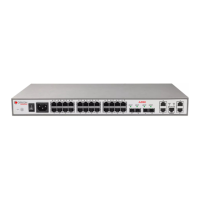A10E/A28E/A28F Configuration Guide
RMON MIBs are grouped into 9 groups according to functions. Currently, there are 4 groups
achieved: statistics group, history group, alarm group, and event group.
Statistics group: collect statistic information on each interface, including number of
received packets and packet size distribution statistics.
History group: similar with the statistics group, but it only collect statistic information in
an assigned detection period.
Alarm group: monitor an assigned MIB object, set the upper and lower thresholds in an
assigned time interval, and trigger an event if the monitored object exceeds the threshold.
Event group: cooperating with the alarm group, when alarm triggers an event, it records
the event, such as sending Trap or writing it into the log, etc.
9.3.2 Preparing for configurations
Scenario
RMON helps monitor and account network traffics.
Compared with SNMP, RMON is a more high-efficient monitoring method. After you
specifying the alarm threshold, the A10E/A28E actively sends alarms when the threshold is
exceeded without gaining the variable information. This helps reduce the traffic of
management and managed devices and facilitates managing the network.
Prerequisite
The route between the A10E/A28E and the NView NNM system is reachable.
9.3.3 Default configurations of RMON
The default configuration of RMON is as below.
Enabled on all interfaces (including Layer 3 interfaces
and physical interfaces)
9.3.4 Configuring RMON statistics
RMON statistics is used to make statistics on an interface, including the number of received
packets, undersized/oversized packets, collision, CRC and errors, discarded packets,
fragments, unicast packets, broadcast packets, and multicast packets, as well as received
packet size.
Configure RMON statistics for the A10E/A28E as below.

